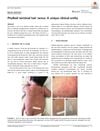 15 citations,
January 2014 in “Dermatology”
15 citations,
January 2014 in “Dermatology” Some patients treated with peginterferon and ribavirin for chronic hepatitis C had mild to moderate skin reactions, but treatment did not need to be stopped.
 15 citations,
July 2008 in “Journal of Dermatological Science”
15 citations,
July 2008 in “Journal of Dermatological Science” Ephrin-A3 helps increase and speed up hair growth in baby mice.
13 citations,
June 2017 in “Biochimie open” All five human steroid 5α-reductase enzymes are found in the endoplasmic reticulum.
[object Object]  11 citations,
August 2013 in “International Journal of Cosmetic Science”
11 citations,
August 2013 in “International Journal of Cosmetic Science” The study suggests that a new protease inhibitor can make hair harder to pull out, potentially reducing hair loss.
 11 citations,
December 2010 in “Archives of Dermatology”
11 citations,
December 2010 in “Archives of Dermatology” A man with rare skin changes on his fingers was diagnosed with multiple myeloma-linked amyloidosis.
9 citations,
September 2019 in “PLoS ONE” K42 and K124 keratins are only found in horse hoof lamellae.
 8 citations,
June 2012 in “Australasian Journal of Dermatology”
8 citations,
June 2012 in “Australasian Journal of Dermatology” A rare form of alopecia causes hair thinning without bald spots and may be more common than thought, responding well to steroid treatment.
8 citations,
May 2005 in “Australian veterinary journal” A Tibetan Terrier had recurring seasonal hair loss for three years.
 7 citations,
November 2000 in “Clinics in Dermatology”
7 citations,
November 2000 in “Clinics in Dermatology” Most hair loss in children is caused by a few common conditions and is easy to diagnose, but rare types require careful evaluation.
 6 citations,
December 2011 in “Clinical and Experimental Dermatology”
6 citations,
December 2011 in “Clinical and Experimental Dermatology” A woman developed rare, unexplained curly hair on her scalp and eyelashes.
5 citations,
January 2021 in “Indian Journal of Pharmacology” Nilotinib can cause generalized keratosis pilaris.
5 citations,
January 2015 in “Saudi journal for health sciences” Alopecia areata in Taif is common, mainly immune-related, and best treated with topical corticosteroids and vitamins.
4 citations,
January 2016 in “The Turkish Journal of Pediatrics” A 5-year-old girl got a rare case of extra hair growth on her arm after a henna tattoo.
3 citations,
March 2019 in “Acta histochemica” Angiotensin II is found at higher levels in black sheep skin and may influence coat color.
 2 citations,
March 2023 in “Skin research and technology”
2 citations,
March 2023 in “Skin research and technology” Temporal triangular alopecia in infants is mostly seen in males at birth, with unique features that help with diagnosis.
2 citations,
October 2016 in “Nutrition in clinical practice” Vitamin B12 deficiency can cause facial dark spots that go away with treatment.
 1 citations,
June 2022 in “The Egyptian Journal of Hospital Medicine”
1 citations,
June 2022 in “The Egyptian Journal of Hospital Medicine” Understanding the genetics of alopecia areata could lead to better treatments.
 1 citations,
September 2007 in “European journal of paediatric neurology”
1 citations,
September 2007 in “European journal of paediatric neurology” Low dose valproic acid treatment caused hair loss in a young patient.
 January 2025 in “Journal of Education Health and Sport”
January 2025 in “Journal of Education Health and Sport” More effective methods are needed to prevent hair loss from chemotherapy.
 January 2025 in “PLoS ONE”
January 2025 in “PLoS ONE” Elf5 controls skin cell growth and development, making it a potential target for skin treatments.

Baricitinib helped treat a man's beard hair loss when steroids didn't work.
May 2022 in “Journal of clinical and nursing research” Fire needle acupuncture is effective for treating alopecia areata.
January 2022 in “Clinical Cases in Dermatology” A 22-year-old man has alopecia areata, an autoimmune hair loss condition, with various treatments available.

Researchers found a genetic link for hereditary hair loss but need more analysis to identify the exact gene.
 June 2021 in “International Ayurvedic Medical Journal”
June 2021 in “International Ayurvedic Medical Journal” Ayurvedic treatments like leech therapy and turmeric-neem paste can effectively treat alopecia areata without harmful side effects.
[object Object] July 2019 in “Dermatology practical & conceptual” The study found that alopecia areata is strongly linked to autoimmune diseases and may indicate a genetic predisposition to such conditions.
 January 2019 in “Current research in diabetes & obesity journal”
January 2019 in “Current research in diabetes & obesity journal” A woman with type 2 diabetes developed alopecia areata, suggesting a link between the two autoimmune conditions.
 January 2019 in “Jui rinsho hifuka”
January 2019 in “Jui rinsho hifuka” A dog's hair loss was caused by a hormone-secreting testicular tumor.
 August 2018 in “Pediatric Dermatology”
August 2018 in “Pediatric Dermatology” A baby had a unique skin condition with a pale patch and surrounding dark hairs, not linked to other health issues.
 February 2017 in “Medicina cutánea ibero-latino-americana”
February 2017 in “Medicina cutánea ibero-latino-americana” An 8-year-old boy with hair loss had hair regrowth and responded well to clobetasol propionate treatment.


















